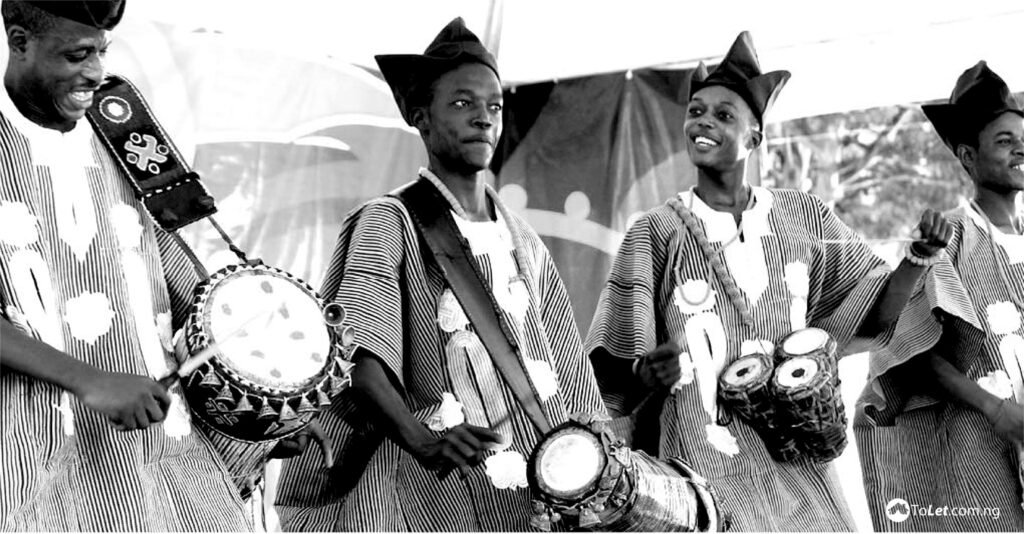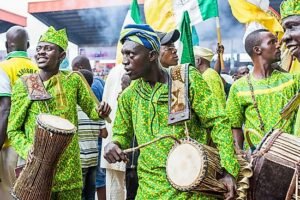The Yoruba people, one of the largest ethnic groups in Africa, primarily reside in southwestern Nigeria. Their culture is rich, their traditions deep-rooted, and their influence widespread. In contemporary times, the Yoruba society has undergone significant changes while preserving its unique identity. Let's dive into the heart of contemporary Yoruba society and explore what makes it tick today.
The Yoruba People: A Brief Overview
To understand contemporary Yoruba society, we need to look at their history and how they've evolved over the centuries. The Yoruba are known for their vibrant culture, which includes elaborate festivals, intricate beadwork, and a strong sense of community.
A Glimpse into Yoruba History
Historically, the Yoruba people were organized into city-states like Ife, Oyo, and Ibadan. These city-states were often powerful, with well-established political systems and flourishing economies. The ancient city of Ife is particularly significant as it's considered the spiritual homeland of the Yoruba people.
Modern Yoruba Cities
Today, the Yoruba people live in various cities that blend tradition and modernity. These cities are hubs of economic activity, cultural heritage, and social dynamism.

Lagos: The Economic Powerhouse
Lagos, though not exclusively Yoruba, has a significant Yoruba population. It’s Nigeria’s largest city and its economic heart. Walking through Lagos, you can see the juxtaposition of traditional Yoruba markets and modern skyscrapers, embodying the essence of contemporary Yoruba society.
Ibadan: The Historical Heartland
Ibadan, the capital of Oyo State, is one of Nigeria’s largest cities and a vital center of Yoruba culture. Known for its historical significance, Ibadan offers a mix of the old and the new, from ancient palaces and traditional festivals to universities and modern infrastructure.
Ife: The Cradle of Yoruba Civilization
Ife is often referred to as the cradle of Yoruba civilization. It remains a crucial cultural and spiritual center, with the Ooni of Ife being a paramount traditional ruler. The city’s ancient art, including the famous Ife bronze heads, continues to attract scholars and tourists alike.
Abeokuta: The City Under the Rock
Abeokuta, known for its rocky landscapes, is another important Yoruba city. It’s famous for the Olumo Rock, a historical site and tourist attraction. The city is also a significant commercial hub with a vibrant local economy.
Yoruba Culture in Contemporary Society
Yoruba culture is dynamic, evolving with the times while maintaining its core elements. This balance between tradition and modernity is evident in various aspects of their society.
Traditional Festivals and Modern Celebrations
Yoruba festivals, such as the Eyo Festival in Lagos and the Osun-Osogbo Festival in Osogbo, are celebrated with great pomp and show. These festivals attract both locals and tourists, showcasing the rich cultural heritage of the Yoruba people. At the same time, contemporary events like concerts and art exhibitions highlight the modern aspects of Yoruba culture.
Cuisine: A Taste of Tradition
Yoruba cuisine is a delightful mix of flavors, with dishes like pounded yam, egusi soup, and jollof rice being staples. In contemporary Yoruba society, traditional foods are enjoyed alongside global cuisines, reflecting the blend of old and new.
Fashion: From Traditional Attire to Modern Styles
Yoruba fashion is vibrant and expressive. Traditional attire, such as the colorful Ankara and Aso Oke fabrics, is worn with pride. However, contemporary Yoruba fashion also embraces modern styles, with designers often blending traditional elements with contemporary trends.
Education and Intellectual Pursuits
Education is highly valued in Yoruba society. The region boasts some of Nigeria’s most prestigious educational institutions, contributing to the intellectual and professional growth of the society.
Universities and Higher Education
Universities like the University of Ibadan, Obafemi Awolowo University in Ife, and Lagos State University are renowned for their academic excellence. These institutions play a crucial role in shaping the future of contemporary Yoruba society.
Literature and the Arts
The Yoruba have a rich literary tradition, with writers like Wole Soyinka and Chinua Achebe gaining international acclaim. Contemporary Yoruba literature and arts continue to thrive, with new generations of artists and writers emerging.
Religion and Spirituality
Religion plays a significant role in contemporary Yoruba society. While Christianity and Islam are widely practiced, traditional Yoruba religion, with its pantheon of deities known as Orishas, remains influential.
Christianity and Islam
Christianity and Islam have significant followings in Yoruba society. Churches and mosques are prominent in Yoruba cities, reflecting the religious diversity of the region.
Traditional Religion: The Orishas
The traditional Yoruba religion, with its belief in Orishas like Sango, Ogun, and Oshun, is still practiced. These deities are revered, and their worship involves elaborate rituals and ceremonies.
Yoruba Language and Communication
The Yoruba language is a vital part of the community's identity. Despite the influence of English due to colonial history, Yoruba remains widely spoken and is taught in schools.
Yoruba Language in Education
Efforts to preserve the Yoruba language include its incorporation into educational curricula. Schools in Yoruba-speaking regions often teach in Yoruba alongside English, ensuring the language's continued relevance.
Media and Technology
The rise of digital media has provided new platforms for Yoruba language and culture. Yoruba movies, music, and online content have a broad reach, both within Nigeria and among the Yoruba diaspora.
Contemporary Challenges and Opportunities
Like any society, contemporary Yoruba society faces its share of challenges. However, it also has numerous opportunities for growth and development.
Economic Development and Employment
While cities like Lagos are economic powerhouses, there are disparities in economic development across the region. Addressing these disparities and creating employment opportunities are key to the society's progress.
Urbanization and Infrastructure
Urbanization presents both opportunities and challenges. While it drives economic growth, it also strains infrastructure. Improving infrastructure and managing urban growth are critical for sustainable development.
Education and Youth Empowerment
Investing in education and empowering the youth are vital for the future of contemporary Yoruba society. Initiatives that focus on skill development, entrepreneurship, and innovation can drive positive change.
Preserving Culture in a Globalized World
Globalization brings cultural exchange, but it also poses a risk to traditional cultures. Efforts to preserve and promote Yoruba culture, both within Nigeria and internationally, are essential for maintaining the society's unique identity.
Frequently Asked Questions
Q: What are some key cities in contemporary Yoruba society? A: Key cities include Lagos, Ibadan, Ife, and Abeokuta.
Q: How does contemporary Yoruba society balance tradition and modernity? A: Yoruba society balances tradition and modernity through cultural festivals, cuisine, fashion, and the integration of traditional elements in modern life.
Q: What role does education play in contemporary Yoruba society? A: Education is highly valued, with renowned universities contributing to intellectual and professional growth.
Q: How is the Yoruba language preserved in contemporary society? A: The Yoruba language is preserved through its inclusion in educational curricula and the rise of digital media promoting Yoruba content.
Q: What are some contemporary challenges faced by Yoruba society? A: Challenges include economic disparities, urbanization, infrastructure development, and preserving culture amidst globalization.
Conclusion
Contemporary Yoruba society is a fascinating blend of the old and the new. From bustling cities and educational institutions to vibrant cultural practices and traditional beliefs, the Yoruba people have managed to preserve their heritage while adapting to modernity. As they navigate the challenges and opportunities of the present day, the Yoruba continue to enrich their society with their unique cultural identity, ensuring that their legacy endures for generations to come.


